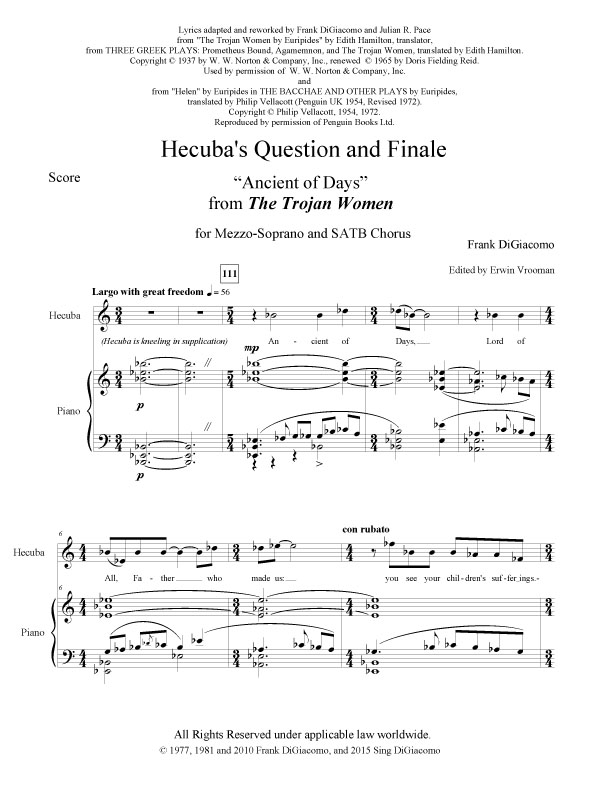Lyrics adapted and reworked by Frank DiGiacomo and Julian R. Pace from “The Trojan Women by Euripides” by Edith Hamilton, translator, from THREE GREEK PLAYS: Prometheus Bound, Agamemnon, and The Trojan Women, translated by Edith Hamilton.
Copyright © 1937 by W. W. Norton & Company, Inc., renewed © 1965 by Doris Fielding Reid.
Used by permission of W. W. Norton & Company, Inc.
and
from “Helen” by Euripides in THE BACCHAE AND OTHER PLAYS by Euripides, translated by Philip Vellacott (Penguin UK 1954, Revised 1972). Copyright © Philip Vellacott, 1954, 1972.
Reproduced by permission of Penguin Books Ltd.
After a poignant scene where Queen Hecuba mourns over the broken body of her beloved grandson, Astyanax, she confronts God, the Ancient of Days, who has allowed the destruction of her family and her city. Like the Scene One Final Chorus, she demands Why? Why? Why?
She no longer asks her question of Apollo, Aphrodite or Zeus, but of God. She acknowledges “I still ask and in the asking and in the learning lies my answer: in the asking, there is God!”
Included in the product offering is a transcription of the orchestration by the Composer to show the richness of the sound palette. The orchestral score for the excerpt listed is available. Contact singdigiacomo@gmail.com with your request.
The Hecuba's Question and Finale has not yet been performed. If you and your organization are interesting in learning and recording this piece, SingDiGiacomo would be interested in the results. If the DiGiacomo Family approves, your performance could be featured on this website and any sales accruing from your performance, available to your organization. Please contact us at singdigiacomo@gmail.com for more information.

LYRICS
(Trumpets sound. The women are slowly led to the ships,
leaving HECUBA alone as she appeared at the beginning of the drama.)
HECUBA:
Ancient of Days,
Lord of All,
Father who made us:
you see your children’s sufferings.
Have we deserved them?
And do you see?
Do you see your temple in Ilium,
your altar of frankincense,
given to the Greek —
the flame from the honey, the corn and the oil,
the smoke from the myrrh floating upward,
the holy citadel?
— and Ida, the mountain where the ivy grows,
and rivers, rivers from snows rush through the glens?
Do you see the embrace of the sky
and the boundary wall of the world
where the first sunlight falls,
the blessed home of the dawn?
The sacrifice is gone,
and the glad call of the dancers,
and the prayers said at evening to the Gods
that last the whole night long.
Gone, too, the golden images we made
out of love for you.
Do you see? Do you care?
Do you listen, oh God,
from your throne in the heavens?
(Hecuba rises majestically)
I call on you to look at me.
Hear me!
I stand before you, alone,
that you may see me clearly.
You cannot look away!
All, all that has happened
has brought me here:
all, all my poor children,
all you have seen before you here
has brought me now before you, to ask you:
Why? Why? Why?
(She kneels again.)
And therein lies my answer:
I have seen all that I have seen,
I have known all that I have known;
I have suffered so much —
but I have lived,
and I still am,
and I have learned to ask: “Why?”
CHORUS:
Farewell, my country,
where once my children lived,
farewell.
(The lights gradually diminish until only HECUBA’s face and hands are lit,
in an attitude of supplication and obeisance.)
HECUBA:
I search, I do not find,
but I still ask
and in the asking,
and in the learning,
lies my answer:
in the asking, there is God!
God! God!
He who asks
is one with God and the Earth.
Honor to him,
honor to he who asks,
and thanks forever!
(She prostrates herself as at the beginning of the drama.)
CHORUS:
Ah!
(Darkness)
END OF THE DRAMA